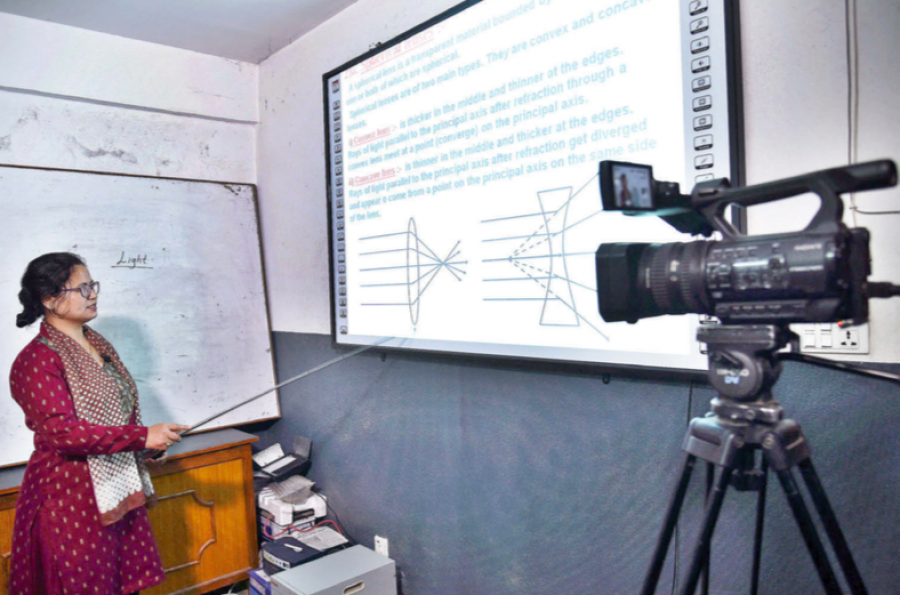National
To open, or not to open
Contradicting messages from government about running schools amid the coronavirus scare confuse guardians.
Binod Ghimire
On Thursday, the Ministry of Health and Population asked guardians not to send their children to school.
On Friday, the Ministry of Education directed schools to operate by ensuring safety protocols. It also gave local governments the authority to take a decision on the closure of schools where students, teachers or other staff test positive for the coronavirus, in coordination with the District Covid-19 Crisis Management Centre.
“The contradicting positions of the education and health ministries show a serious lack of coordination,” said Suprabhat Bhandari, chair of the Nepal Guardian Federation, on the different views on schools to check the spread of the pandemic.
The Health Ministry’s directive came as the number of Covid-19 cases has seen a steady increase in the last two weeks with 836 new cases reported during the last 24 hours on Friday. The number of new cases reported on Thursday stood at 490, according to the ministry.
The differing recommendations have left guardians confused and they say they cannot trust the government to keep their children safe from the virus.
“I neither believe in the school nor do I have trust in the government to contain the virus,” said Suman Parajuli, 43, from Banasthali, Kathmandu, father of a 13-year-old girl.
The Ministry of Education had held consultations with the representatives of the private and public schools and associations of guardians and teachers earlier this week following recommendations of the Health Ministry on Saturday to shut down schools in densely populated areas for three weeks.
But school operators resisted, according to a participant at the meeting.
“The Education Ministry seems to have bowed to private schools,” Bhandari, who was present at the meeting, told the Post.
Public health experts, on the other hand, are concerned that schools could be breeding grounds for the virus as some 12 percent of those infected in the recent surge of cases are children against 4 percent last year.
As many as 271 children reported positive in the last two weeks with the death of one.
“Children could carry the virus from the schools to their homes or vice versa. Schools very much fall in the risk zone,” Dr Sher Bahadur Pun, chief of the Clinical Research Unit at Sukraraj Tropical and Infectious Disease Hospital, told the Post.
In its advisory on Thursday, the Health Ministry categorically said sending students to schools of 14 districts was risky. These districts include Kathmandu, Lalitpur, Bhaktapur, Kaski, Rupandehi, Chitwan, Banke, Parsa, Kailali, Morang, Dang, Surkhet, Bara and Baglung.
Health Ministry officials say that it cannot close the schools as it is not an enforcing agency but can only recommend.
Ministry of Education officials, on their part, say that there is no need to close down schools as it would create unnecessary fear and terror in the academic sector regarding the pandemic.
“Everyone should be careful about not creating unnecessary fear in the academic sector,” said Deepak Sharma, spokesperson for the ministry. “The ministry is closely assessing the present scenario.”
But education experts accuse the Education Ministry of irresponsibility.
“The Education Ministry is very irresponsible,” Binay Kusiyait, a professor at the Tribhuvan University, told the Post. “It should be concerned about the safety of students above everything else. The incumbent government, however, works at the behest of the private schools.”
The worry is widespread.
“As the Health Ministry is the line agency to make decisions regarding the health issues, future steps should be taken based on its assessments,” said Bhandari, the chairperson of the Nepal Guardian Federation.
Education experts and guardians say since this is the prime time for private schools to collect fees with most of them beginning new admissions or conducting the final tests, they aren’t willing to close the schools until they complete their collection.
The academic session is ending in June this year as the government extended it by two months to make up for the time lost to the pandemic. However, many private schools are already conducting the final exams while some have started admissions for the new academic session.
But observing safety protocols and conducting classes as directed by the Education Ministry is not feasible for lessening the risk of infections as school infrastructures are poor and they don’t have the space for proper physical distancing.
“Most of the schools have over 30 students in a classroom which is very risky,” said Pun.
Meanwhile, Kathmandu Metropolitan City on Friday, in line with the decision of the Ministry of Education, decided to close the schools for a week where teachers, students or other staff test positive for Covid-19.
According to Bhandari, given the reluctance of the Ministry of Education and the growing risk of spread of infections, guardians have started lobbying the local governments to stop the in-person teaching-learning process.
“The irresponsible decision of the Education Ministry could put the health of hundreds of school children at risk,” Dhananjaya Sharma, former principal at Gyanodaya School in Kathmandu, told the Post.
Parajuli does not want to take the risk.
“I will enroll her if the school decides to run online, if it doesn’t, I will help her to study at home,” the 43-year-old father said.
(Anup Ojha contributed reporting)




 13.12°C Kathmandu
13.12°C Kathmandu














